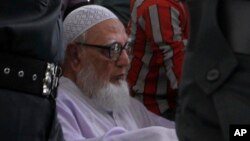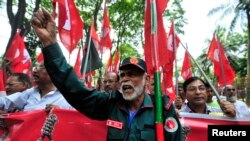NEW DELHI, INDIA —
In Bangladesh, a controversial war crimes court has sentenced a top Islamist leader to 90 years in prison for his role in atrocities committed during the country’s war of independence. The sentencing of 90-year-old Ghulam Azam has triggered violent clashes in which two people have died and several have been injured.
The sentence was handed down Monday to the former head of Jamaat-e-Islami party, Ghulam Azam, in a packed courtroom in Dhaka. Azam, brought to court in a wheelchair, was found guilty of several crimes including inciting and planning war crimes in 1971, when Bangladesh broke free of Pakistan.
Prosecutors said he played a key role in setting up militia groups that killed and raped thousands of people. His defense lawyers said the charges were politically motivated.
Clashes erupted even before the verdict was read out as Jamaat-e-Islami activists threw stones and torched vehicles in Dhaka and other cities. Police fired rubber bullets to disperse protestors. Several people were injured in the violence which began on Sunday.
Ghulam Azam is the fifth leader of the Jamaat-e-Islami party to be sentenced since January by the war crimes tribunal, set up by the Awami-League led government in 2010. The trials have triggered violence that has left more than 100 people dead since January.
Professor Ataur Rahman at Dhaka University said Azam’s sentence could spark another round of deadly violence in the country.
“They will be on streets now, they are very frustrated and very angry. There will be more confrontation on this issue, there will be a new wave of protesting against the government, so we are expecting crisis after crisis,” said the professor.
Prime Minister Sheikh Hasina’s critics said she was using the tribunals to settle political scores and weaken the opposition ahead of next year’s general elections. Hasina said the prosecutions were an attempt to find justice for the tens of thousands of people who died during the country’s struggle for independence forty years ago and their surviviors.
Professor Rahman said the trials have alienated Islamic groups in the country from the ruling party. He said this was working to the advantage of the main opposition party.
“The main opposition, Bangladesh Nationalist Party is capitalizing on these problems of the government, and they are now mobilizing on the support of the Islamic groups as well as their own support. So this will be a tremendous pressure on the government,” he said.
Many middle class, secular people in Bangladesh support the trials and are calling for stiff punishments for the Islamist leaders. But experts said out in the countryside there was strong support for the Jamaat-e-Islami party and anger at the ongoing trials.
Human rights groups have also criticized the war crimes tribunal for falling short of international standards.
The sentence was handed down Monday to the former head of Jamaat-e-Islami party, Ghulam Azam, in a packed courtroom in Dhaka. Azam, brought to court in a wheelchair, was found guilty of several crimes including inciting and planning war crimes in 1971, when Bangladesh broke free of Pakistan.
Prosecutors said he played a key role in setting up militia groups that killed and raped thousands of people. His defense lawyers said the charges were politically motivated.
Clashes erupted even before the verdict was read out as Jamaat-e-Islami activists threw stones and torched vehicles in Dhaka and other cities. Police fired rubber bullets to disperse protestors. Several people were injured in the violence which began on Sunday.
Ghulam Azam is the fifth leader of the Jamaat-e-Islami party to be sentenced since January by the war crimes tribunal, set up by the Awami-League led government in 2010. The trials have triggered violence that has left more than 100 people dead since January.
Professor Ataur Rahman at Dhaka University said Azam’s sentence could spark another round of deadly violence in the country.
“They will be on streets now, they are very frustrated and very angry. There will be more confrontation on this issue, there will be a new wave of protesting against the government, so we are expecting crisis after crisis,” said the professor.
Prime Minister Sheikh Hasina’s critics said she was using the tribunals to settle political scores and weaken the opposition ahead of next year’s general elections. Hasina said the prosecutions were an attempt to find justice for the tens of thousands of people who died during the country’s struggle for independence forty years ago and their surviviors.
Professor Rahman said the trials have alienated Islamic groups in the country from the ruling party. He said this was working to the advantage of the main opposition party.
“The main opposition, Bangladesh Nationalist Party is capitalizing on these problems of the government, and they are now mobilizing on the support of the Islamic groups as well as their own support. So this will be a tremendous pressure on the government,” he said.
Many middle class, secular people in Bangladesh support the trials and are calling for stiff punishments for the Islamist leaders. But experts said out in the countryside there was strong support for the Jamaat-e-Islami party and anger at the ongoing trials.
Human rights groups have also criticized the war crimes tribunal for falling short of international standards.





